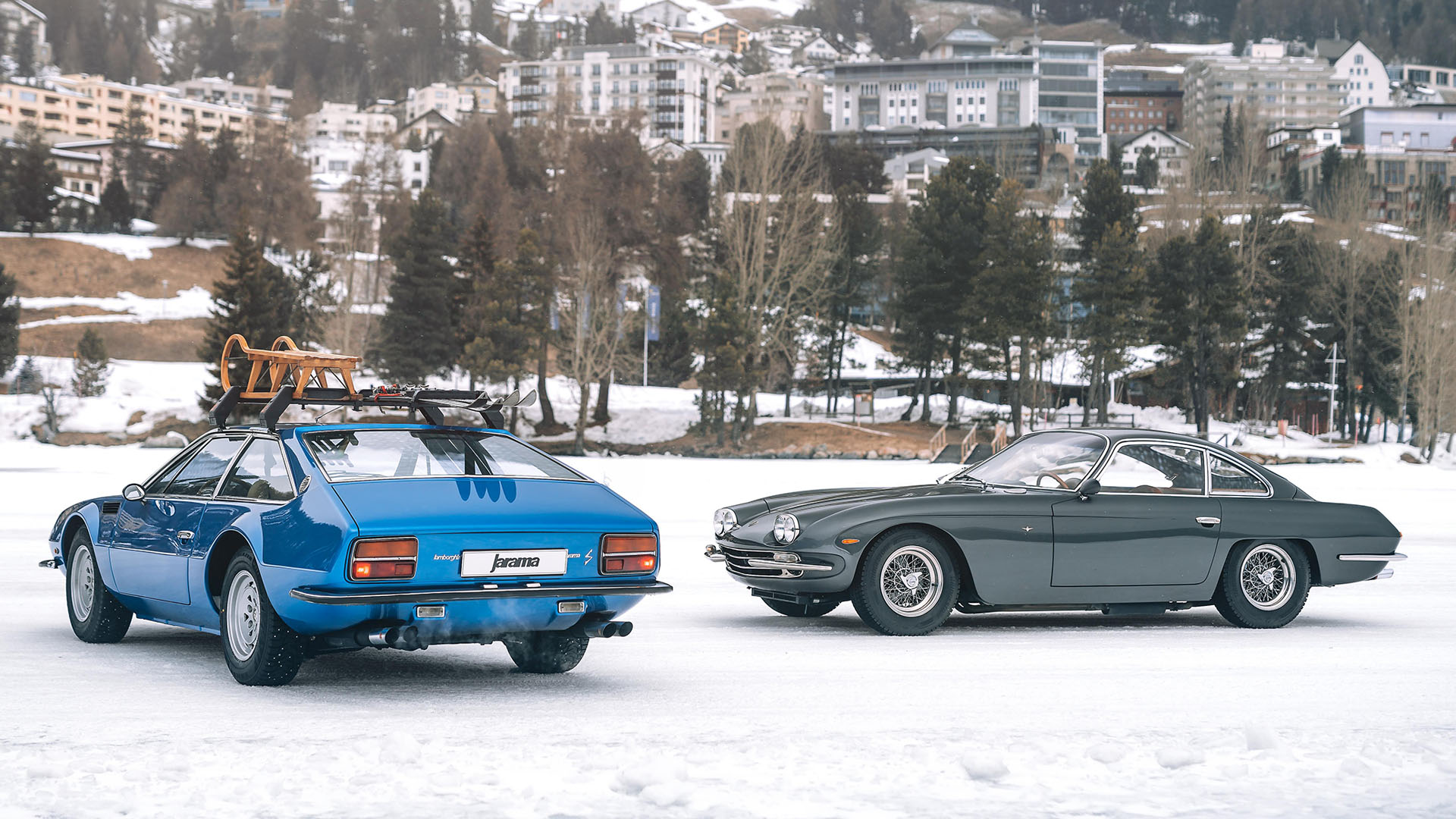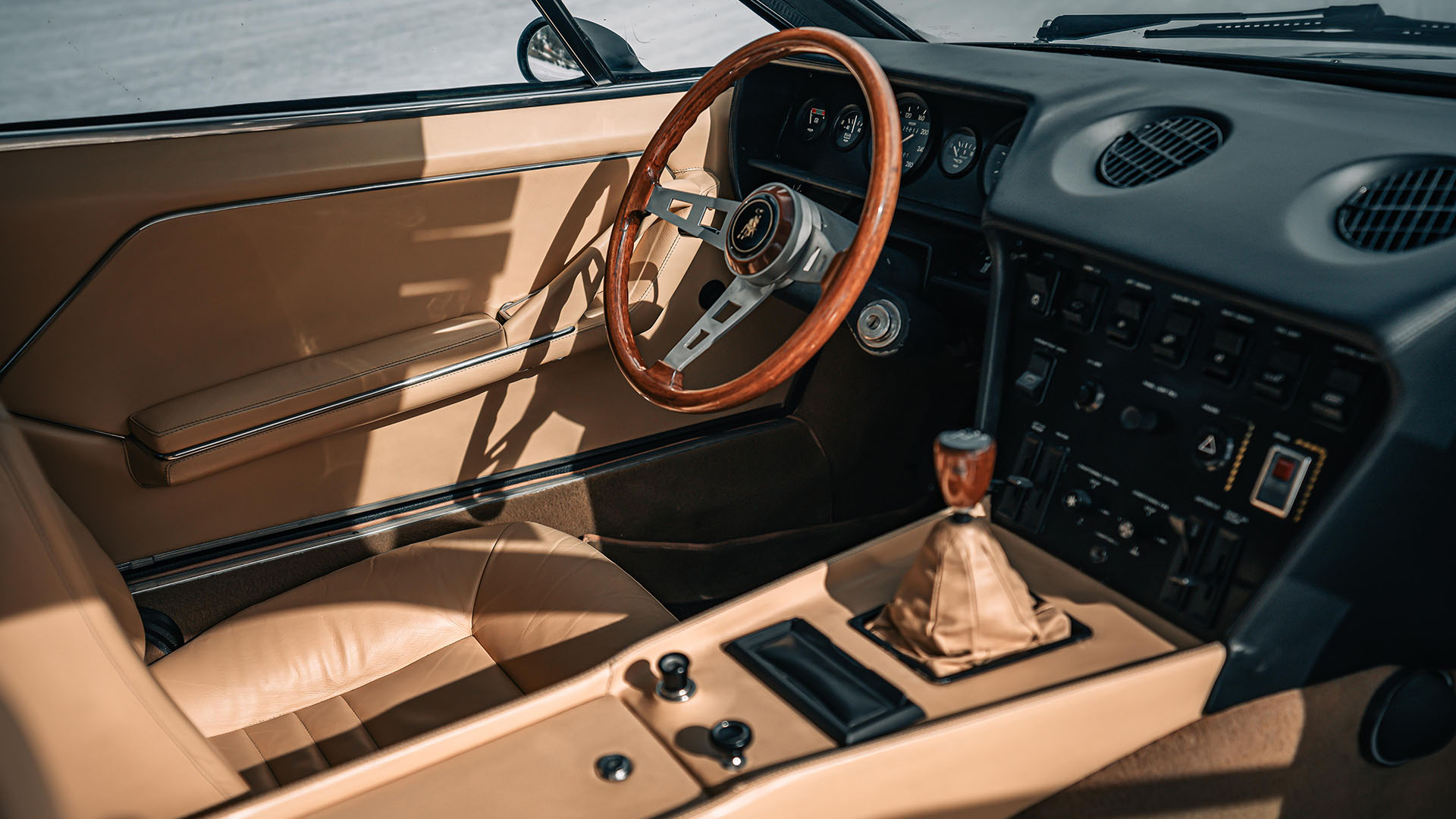Automobili Lamborghini participated in The I.C.E. (International Concours of Elegance, organized on the frozen lake of St. Moritz from 23 to 24 February, for the second year. The House of Sant’Agata Bolognese was represented by Lamborghini Polo Storico, the point of reference for all international Lamborghini enthusiasts and collectors, many of whom were welcomed at the event. During the event, Automobili Lamborghini showcased two cars from its Sant’Agata Bolognese museum collection: a 1973 Jarama GTS, ready for a weekend in the snow complete with ski rack, skis, and toboggan, and a 1968 400 GT 2+2: both important cars in the company’s history. Although representative of two different historical decades, the 1960s with its rounded shapes and the 1970s with its characteristic angular design, both Lamborghini 2+2s featured in St. Moritz are equipped with the same powerplant: the legendary Lamborghini 4-liter V-12, with twin overhead camshafts in the front longitudinal position.
“The I.C.E.”, which stands for the International Concours of Elegance and is now in its third edition, established itself right from the start as one of the most captivating events in the world of classic cars. In addition to the Concours itself, where the over 50 cars entered are judged not only by specialists in the field but also by artists and architects, the main attraction of the event is the stage on which it takes place: the frozen lake of St. Moritz nestled in the Engadine valley.
Alessandro Farmeschi, Global After Sales Director of Automobili Lamborghini, remarked, “Polo Storico’s participation in The I.C.E. was an opportunity to meet our customers and enthusiasts of classic Lamborghini models in a truly unique setting. This event is close to our own spirit and our way of celebrating the passion for our classic cars: beautiful to see but also fun and exciting to drive. It is an unusual context in which to see a historic Lamborghini, even more so when these are cars that are usually admired in our museum.”
With its presence in St. Moritz, Lamborghini Polo Storico begins its 2024 together with customers and enthusiasts, ushering in a year already full of goals, certifications, and restorations, confirming an increasing commitment to preserving the historical heritage of the House of Sant’Agata Bolognese.
The forgotten Lamborghini, a 1973 Jarama GTS
The Jarama GT is presented at the Geneva Motor Show in March 1970. It is Lamborghini’s new GT 2+2, created to replace the Islero it retains the mechanics. The ultra-modern body style is the work of Carrozzeria Bertone and is a perfect expression of the automotive shapes that would characterize the 1970s, made of taut, angular lines. The Jarama is a true Gran Turismo car, perfect for comfortable, fast, and pleasurable long-distance driving in luxury.
Its design allows it to accommodate two adults and two children in the back seat, and several pieces of luggage. One of the stylistic features of the Jarama is the eyelids that cover the front headlights when not in use, a unique feature in the entire history of Lamborghini production. In 1972 the Jarama GTS was born, featuring an engine, the same 4-liter, made more powerful and now capable of 365 hp and some aesthetic changes, such as a raised air intake on the hood, air intakes on the front fenders, and newly designed Campagnolo wheel rims. Inside the cabin, the GTS receives seats with contoured backrests to allow better roominess for the rear seats, an aluminum fascia to cover the dashboard, a new secondary button arrangement, and standard power steering.
Production lasted until 1976, and no replacement model was planned when the Jarama went out of production. A total of 327 units were produced: 177 GTs and 150 GTSs. The 1973 GTS on display in St. Moritz, now owned by Automobili Lamborghini, was sold new in Sicily and is in its original configuration with Blu Tahiti body and mustard-yellow interior.
The ultimate Italian GT from the Sixties, the 1968 400 GT 2+2
In 1966 the 400 GT was presented at the Geneva Motor Show, slightly revised in its lines compared to the 350 GT, especially in the rear part of the body, raised by 6.5 centimeters to become a 2+2 and equipped with the 12-cylinder engine increased to 4 liters, delivering 320 hp at 6500 rpm thanks to the increased bore. With the 400 GT the V12 engine reached its perfect stage of development and would become Lamborghini’s signature engine, going on to equip, with their respective evolutions, all 12-cylinder cars produced in the following decade in Sant’Agata Bolognese.
The 400 GT also adopted the Lamborghini gearbox and differential, designed and made in-house, and a revised rear suspension. In the October 1966 issue of American Road & Track magazine, the 400 GT was called “the best GT we’ve ever had a chance to test,” a remark that pleased Ferruccio Lamborghini who, only three years earlier, had begun his new venture with the desire to make just the best GT in the world. The 400 GT 2+2 on show in St. Moritz was delivered in March 1968 to the Grand Garage des Nations in Geneva, in the Grigio Saint Vincent livery with tobacco-brown interior, and is now part of the collection of the Automobili Lamborghini Museum.













